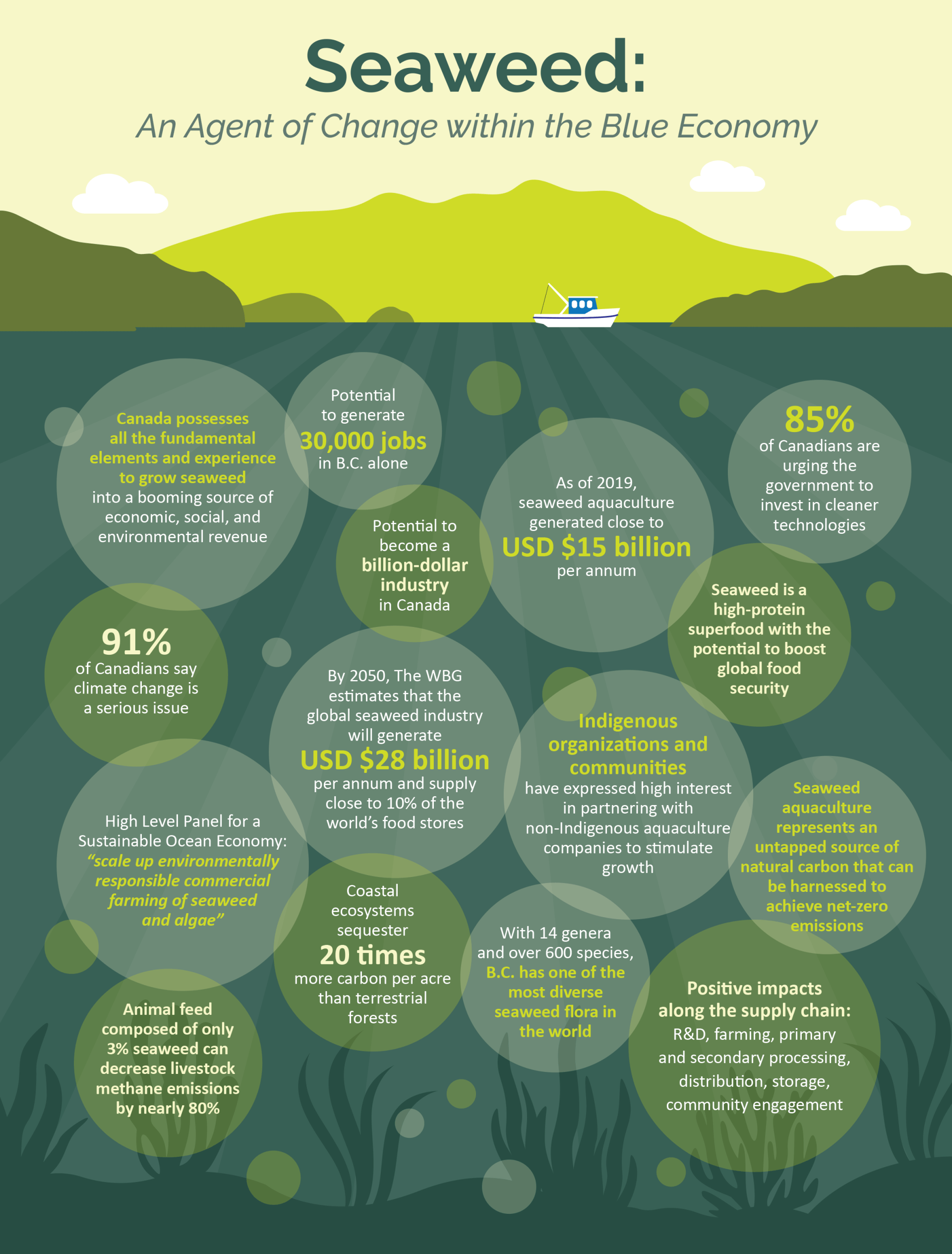Integrating Seaweed Aquaculture into Canada's Blue Economy Strategy
A Call to Action
Background:
The Department of Fisheries and Oceans Canada (DFO) has requested feedback for the consideration of the development of a national Blue Economy Strategy. They have encouraged individuals and organizations from ocean industry sectors, coastal and Indigenous communities, environmental groups and other levels of government to provide feedback by June 15, 2021.
In response, Cascadia Seaweed hosted a roundtable discussion with stakeholders from BC involved in or supportive of growing the seaweed supply chain.
As the Federal Government is also creating a new comprehensive Aquaculture Act, we feel this is an opportune time to:
Inform the Federal Government of the climate benefits of seaweed cultivation and outline its known uses;
Indicate how seaweed fits into the Blue Economy discussion and benefits coastal and Indigenous communities; and
Encourage a unique set of regulations for seaweed within the aquaculture triangle.
The valuable perspectives and information collected at this roundtable was formulated into a report which we are pleased to share. The Introduction and a link to download the full report are below.
Introduction to the report:
The purpose of this submission is to present the significant and timely opportunities for seaweed production and processing on Canadian coasts. This budding industry has the potential to stimulate the economy through job generation and new consumer markets, to foster reconciliation through partnerships with Indigenous communities, and to benefit our precious marine ecosystems through habitat restoration, carbon sequestration, and mitigation of rising ocean pH levels. In its strategy to build a sustainable blue economy, the Government of Canada cannot overlook the advantages of seaweed farming.
This call to action is backed by the expert opinions of Cascadia Seaweed and partner signatories. The unified voice of all signatories herein carries no small weight and must be heard with the greatest attention and urgency.
As the Blue Economy Strategy (BES) engagement paper underscores, ocean health is “under increasing pressure from overexploitation, pollution and climate change.” According to the latest climate report from the World Meteorological Organization, sea-level rise is accelerating as ice caps at the Arctic and Antarctic poles continue to melt and the world’s oceans continue to store heat and acidify. The intensifying incidence of natural disasters such as hurricanes, heatwaves, wildfires, and droughts has resulted in billions of dollars in damage and displaced millions of people. The year 2020 was in the top three warmest years ever recorded, all of which have occurred over the past six years [1].
The recent global pandemic has only exacerbated the human impact of these phenomena and further revealed the fragile ties between our economy and environment. Concentrations of CO2 increase in the oceans just as they do on land, but the oceans suffer more than double the damage as they already act as a global cooling system, storing 90% of the Earth’s heat. Now more than ever, the world must invest in greener technologies and behaviours to maintain global temperatures within 1.5 °C above pre-industrial levels and protect ecosystem services. As of 2020, mean temperatures approach this threshold, hovering at 1.2 °C ± 0.1 °C [1]. With the longest coastline in the world and a rich marine biodiversity, Canada has the opportunity to cultivate a green resource with the potential to curb climate change, address food insecurities, and secure the sustainability of the blue economy: seaweed.
Signatories were surprised and concerned that seaweed was not mentioned in the BES consultation. Stakeholders in Canada’s emerging seaweed sector are urging the federal government to invest in the development of the industry, which will invariably contribute to revitalizing remote, rural, Indigenous, and coastal communities and to driving growth and innovation in sustainable, regenerative aquaculture.
This submission urges the Government of Canada to stimulate growth in the initial stages of the national seaweed industry by;
streamlining the tenure regulations for seaweed cultivation, designing a separate approval track, and fostering interdepartmental coordination to connect stakeholders with relevant authorities;
investing in production and processing techniques and infrastructure, particularly food processing as it is the highest-value product in the short term, to create regional value production points; and
investing in phycology, policy, and marketing research along with specialized training programs for the future seaweed workforce.
New Paragraph
C - 9774 Third Street Sidney British Columbia V8L 3A4
Email: info@cascadiaseaweed.com
Phone: 1-778-351-4484

9774 - C Third Street Sidney British Columbia V8L 3A4
Email: info@cascadiaseaweed.com
Phone: 1-778-351-4484

